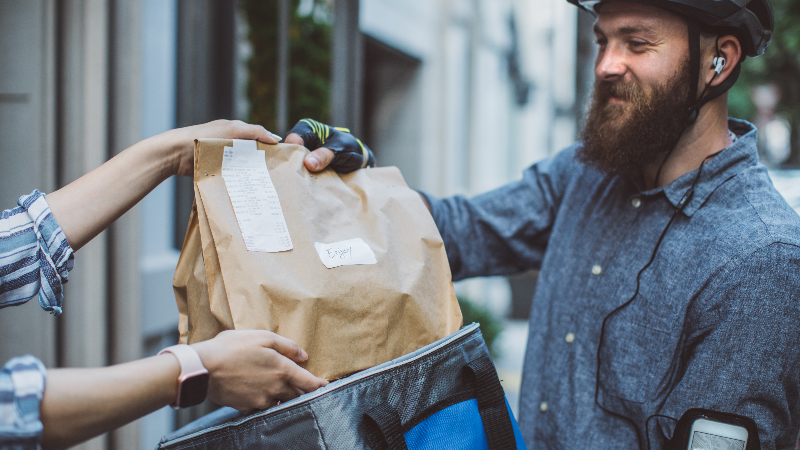Over the last few years, especially since the pandemic, food delivery apps have grown from relative obscurity to a ubiquitous powerhouse industry and an essential part of many people’s everyday lives.
Many credit card issuers are now leveraging the popularity of these services and partnering with food delivery apps to offer cardholders extra benefits. The best credit cards for food delivery are also typically found among our best credit cards for restaurants or best grocery rewards cards, meaning you’ll earn even more rewards on those purchases.
Comparing the best credit cards for food delivery
The best credit cards for food delivery combine elevated earning rates with perks for food delivery apps, ranging from discounts to premium memberships.
|
Card Name |
Best for |
Highlights |
Bankrate Score |
|
Chase Sapphire Reserve® |
DoorDash |
|
5.0 |
|
American Express® Gold Card |
Grubhub |
|
4.9 |
|
The Platinum Card® from American Express |
Uber Eats |
|
4.8 |
|
Instacart Mastercard®* |
Instacart |
|
4.1 |
|
Prime Visa |
Amazon Fresh |
|
4.2 |
Top credit cards for food delivery
-
The Chase Sapphire Reserve offers a complimentary DoorDash DashPass membership for 12 months (activate by Dec. 31, 2027), which includes unlimited DoorDash deliveries with no delivery fee and reduced fees on orders over $12. Card members enrolled in DashPass also receive a $5 DoorDash credit per month (through Jan. 31, 2025). Starting in February, that will change to a $5 monthly credit for a restaurant order, which complements a new promotion for $10 off non-restaurant orders twice a month. Add your card as a default payment method to the DoorDash app and click the activation button to start your membership. You must use your card at checkout to receive DashPass benefits.
-
The American Express® Gold Card is excellent for restaurant and takeout lovers. You’ll earn 4X Membership Rewards points on restaurants (including takeout and delivery) for up to $50,000 in purchases per year (1X after). You can also earn up to $120 in dining credits annually ($10 per month; enrollment required) on eligible purchases with Grubhub or several other options. To earn the $10 in monthly dining credits or 4X points on restaurants for Grubhub orders, simply pay for eligible purchases with your card after activating the benefit. You can also use your American Express points to pay for Grubhub orders at checkout and choose the amount you would like to spend.
-
In addition to a laundry list of other perks, The Platinum Card® from American Express offers up to $200 in Uber Cash each year, which you can also use for Uber Eats orders. You’ll get $15 monthly, plus an extra $20 in December. To take advantage of the Uber benefit, add your card to your Uber account and make sure to select it as the payment option for your order. You can also stack this credit with the monthly Uber credit from the Amex Gold card.
-
The Instacart Mastercard® is an obvious choice if you use Instacart for most of your grocery and household shopping. You’ll earn 5 percent back on all Instacart app and Instacart.com purchases (excludes restaurant orders powered by Uber Eats) and get a $50 Instacart credit upon approval. While this earning rate is better than many other cards in similar categories, you’re limited to shopping through Instacart to earn the best rates, as other categories on this card don’t offer nearly as good of a return on spending.
-
The Prime Visa is the prime choice for Amazon shopping, meaning it’s also an excellent choice for its grocery service, Amazon Fresh. Prime members earn an unlimited 5 percent cash back at Amazon.com, Amazon Fresh and Whole Foods Market, which covers almost any purchasing need you might have at a high cash back rate. For a limited time, Prime members can also get a $200 Amazon gift card upon approval to boost their purchase power, making this one of the best cards currently available to maximize Amazon purchases.
How to choose the best credit cards for food delivery
While food delivery perks are a welcome addition to the best credit cards for food delivery, the best choices should offer you much more than that. Here are some things to consider when deciding which card works best for you.
- Determine your delivery needs. Consider whether you just want to order takeout or have groceries or other household items delivered. Every app covers a different set of bases regarding the merchants it offers.
- Look at the fees charged per delivery. Each app has a different fee structure. Depending on where you shop, some charge more for delivery and service fees. You’ll also want to consider whether a subscription fee is worth it and what you’d get in return. If you do pay for a subscription, make sure the discounts, reduced fees, and the amount you’ll use the service justify the added cost.
- Assess the annual fee and the benefits. The benefits and reward rates should provide more value than the annual fee to ensure the cost is worth it. Review this assessment periodically to ensure you always get the most value from your card.
- Consider spending and travel needs. Food delivery perks should be just one of many reasons you choose a credit card. Consider where you spend the most money and what kind of travel needs you have to see which additional benefits and reward categories best align with your overall needs.
- Figure out how you’ll use the rewards. While cash back from cards is easier to redeem, you may potentially get more value from cards earning points. Take a look at how you can redeem points and see whether opportunities for extra value present themselves.
Maximizing the best credit cards for food delivery
The best way to maximize the value of your credit card for food delivery is to take advantage of welcome offers and additional perks. Using Bankrate’s valuations to assess the value of point currencies and welcome offers, here’s a comparison of how much you can earn in credits with each of our choices.
For this comparison, first-year value includes our valuation of the current welcome offer plus any credits earned only in the first year. Ongoing maximum value includes any tangible statement credit earned over the year, including maximizing food delivery promos. Credits that aren’t earned annually, like Global Entry and TSA PreCheck, are divided into an annual portion.
|
Card |
First-year value |
Maximum ongoing value |
Annual fee |
|
Chase Sapphire Reserve® |
$1,200 |
$630 |
$550 |
|
American Express® Gold Card |
$1,200 |
$424 |
$325 |
|
The Platinum Card® from American Express |
$1,600 |
$1,624 |
$695 |
|
Instacart Mastercard® |
$50 |
$0 |
$0 |
|
Prime Visa |
$200 |
$0 |
$139 (cost of Amazon Prime membership) |
The significant difference is the lack of ongoing value from the co-branded options compared to the cards with flexible point currencies. While those choices provide much more flexibility and broad value, the co-branded options are still valuable for people who frequently utilize Instacart or Amazon.
However, if you can fully maximize one of the flexible travel card options, that would likely be your best choice.
Frequently asked questions
What’s next?
Check out these Bankrate tools to match your next card.
The bottom line
Food and grocery delivery apps are fast and convenient for meeting your culinary needs. These apps make it easy to have your favorite foods and grocery essentials delivered to your door with just the click of a button. However, you’ll want to make sure any card you choose offers you much more value than just the food delivery perks. Examine your overall needs to determine which card fits you best.
*The information about the Instacart Mastercard® has been collected independently by Bankrate.com. The card details have not been reviewed or approved by the card issuer.
Read the full article here
















